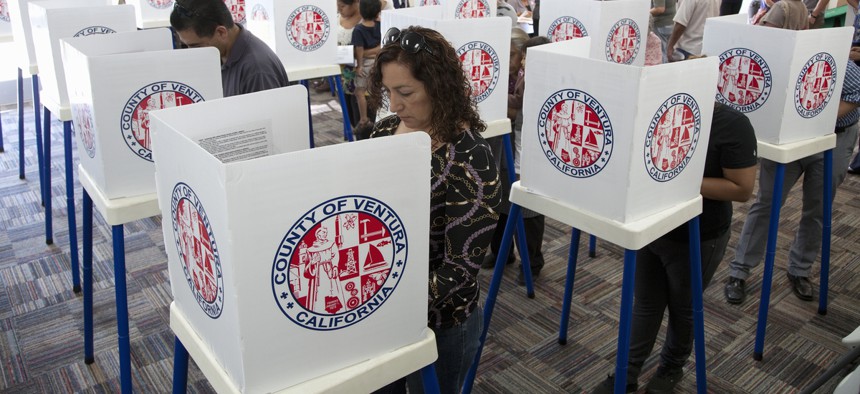Movement to Allow Campaign Funds to Pay for Child Care Dealt Setback in Connecticut

Shutterstock

Connecting state and local government leaders
STATE AND LOCAL ROUNDUP | Amazon to locate new offices across a very short bridge ... Arizona considers fining teachers for influencing student political views … St. Paul loses its bikes.
Connecticut’s election officials this week ruled that candidates for state political office can’t use public campaign money to pay for child care. The five-member Elections Enforcement Commission voted unanimously against a plea for change filed by Caitlin Clarkson Pereira, who ran unsuccessfully for a state House seat in 2018. The commission members, who are all male, said they were guided by the letter of the law. They said they thought the issue would be better taken up by the legislature. “We don’t have the authority to just automatically change the regulations,” commission member Stephen Penny told the Hartford Courant. “It’s a long and convoluted and lengthy process.” Clarkson Pereira vowed to continue to pursue the issue. “This is not the end of the road,” she said. It’s the latest chapter in a story that has been unfolding in starts and stops around the country. Last year, Liuba Grechen Shirley, a congressional candidate from New York, successfully petitioned the Federal Election Commission to allow her to use campaign money to pay a babysitter. That FEC ruling, however, doesn’t apply to state races. Massachusetts, West Virginia, Oakland, Calif. and Tucson, Ariz., currently ban the use of public campaign grants for child care, while Maryland and Minnesota allow it. In other places, like New York City and Connecticut, parents can use privately raised funds, but not any public grants, for campaign-related child care. In Louisiana, an ethics commission first voted against allowing candidates to fund child care with campaign funds. But then, in February, after a public outcry and lobbying by state leaders, a reconfigured commission reversed its decision. [Hartford Courant, The Advocate]
JOBS | It's not quite a HQ2, but Amazon is making big changes in the Seattle area, moving on a big expansion in nearby Bellevue. GeekWire this week first reported on an internal email that described company plans to relocate Amazon’s worldwide operations team nine miles east, from the company’s South Lake Union headquarters in Seattle to the company’s new campus across Lake Washington. Amazon currently employs 45,000 people at its Seattle headquarters and 700 in Bellevue, according to GeekWire. In recent years, the relationship between Amazon and Seattle has hit rocky patches. The company last year drew attention to its role in exacerbating the city’s housing crisis when it led a movement among businesses to repeal a just-passed corporate head tax meant to fund affordable housing. In Bellevue, Amazon will join Microsoft on the east side of the lake. Microsoft’s corporate headquarters is located in Redmond, just northeast of Bellevue. [GeekWire, Seattle Times]
TEACHER FINES | A Senate committee in Arizona has taken up a proposal that would allow the state to fine teachers up the $5,000 for attempting to influence student political or religious views. Opponents of the bill see it as retribution for last year’s teacher strike. “Republicans who control the committee made it clear they were targeting [participants in] last year’s ‘Red for Ed’ movement, which saw red-shirted teachers go on strike for six days and march by the tens of thousands on the state Capitol,” the Associated Press reported. [AP]
NO CHAPLAINS | After the U.S. Supreme Court ruled that Texas must allow an inmate to have a Buddhist chaplain present at his execution, the state banned all prison chaplains from the death chamber. The state only allows employees in the execution chamber and doesn't employ a Buddhist chaplain. [Texas Tribune]
TRANSPORTATION | St. Paul, Minnesota, has lost its bike-share vendor. Lime won the contract to set up the city’s program last-August but now says it wants to provide scooters instead of bikes. “I think that will annoy a lot of people,” a bike-share rider told the Star Tribune. St. Paul hopes to find a new vendor soon and get bikes on the streets before the city’s northern summer comes and goes. [Star Tribune]
John Tomasic is a journalist who lives in Seattle.

NEXT STORY: Voter ID Laws Don’t Seem to Suppress Minority Votes—Despite What Many Claim




